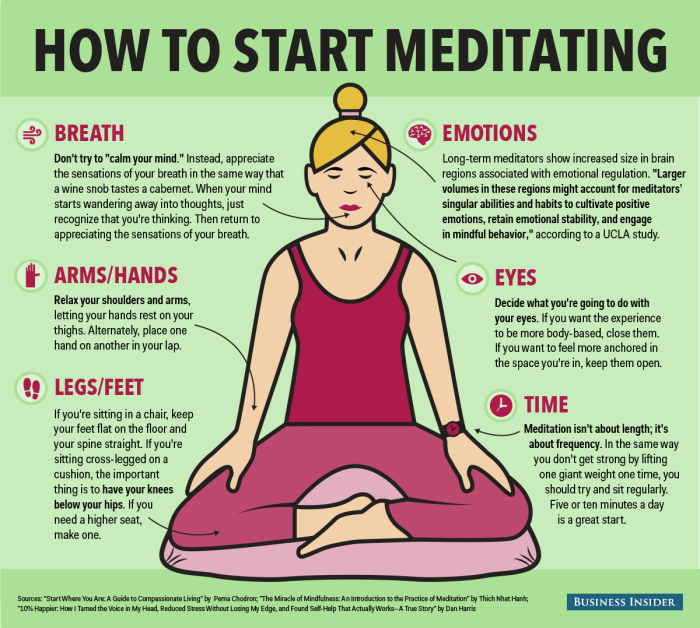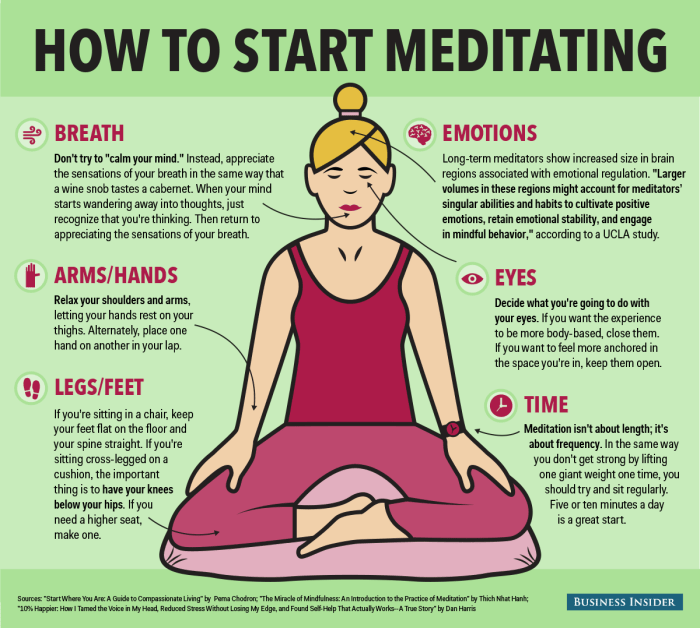Meditation for Beginners sets the stage for a transformative experience, diving into the realm of mindfulness and self-discovery with a modern twist. Get ready to explore the art of meditation in a whole new light.
Whether you’re seeking stress relief, mental clarity, or simply a moment of tranquility, this guide will walk you through the basics and beyond.
Introduction to Meditation for Beginners

Meditation is a practice that involves focusing the mind and eliminating distractions to achieve a state of mental clarity and calmness. For beginners, meditation can be a powerful tool to reduce stress, improve concentration, and promote overall well-being.
Benefits of Meditation for Beginners
- Improves focus and concentration
- Reduces stress and anxiety levels
- Promotes emotional well-being
- Enhances self-awareness and mindfulness
Importance of Meditation for Mental Health
Meditation is important for mental health as it allows individuals to develop a greater sense of self-awareness and emotional regulation. By practicing meditation regularly, beginners can learn to observe their thoughts and emotions without judgment, leading to a more positive outlook on life.
How Meditation Helps Reduce Stress and Anxiety
Meditation can help reduce stress and anxiety by calming the mind and promoting relaxation. By focusing on the present moment and letting go of negative thoughts, beginners can experience a sense of peace and tranquility that can carry over into their daily lives.
Getting Started with Meditation

To begin a meditation practice, follow these steps to create a peaceful environment and learn basic techniques.
Choosing the Right Environment
When starting your meditation practice, it’s important to find a quiet and comfortable space where you can relax without distractions. Choose a room with soft lighting and a comfortable cushion or chair to sit on.
Creating a Peaceful Space
To create a peaceful space for meditation, consider adding elements like candles, essential oils, or calming music to enhance the atmosphere. Make sure the room is clean and clutter-free to promote a sense of relaxation and tranquility.
Basic Meditation Techniques
- Practice Mindful Breathing: Sit comfortably with your eyes closed and focus on your breath. Notice the sensation of air entering and leaving your body, and let go of any distracting thoughts.
- Body Scan: Start at the top of your head and slowly scan down through your body, paying attention to any areas of tension or discomfort. Take deep breaths to release tension and promote relaxation.
Common Challenges for Beginners
Starting a meditation practice can be challenging for beginners due to various obstacles that may arise. Distractions, restlessness, and difficulty focusing are some of the common challenges that beginners face when trying to meditate. Here are some tips to help overcome these challenges:
Distractions During Meditation
Distractions such as noises, thoughts, or physical discomfort can easily disrupt your meditation practice. To overcome distractions, try the following strategies:
- Acknowledge and accept distractions without judgment, then gently redirect your focus back to your breath or mantra.
- Create a designated quiet space for meditation to minimize external distractions.
- Use earplugs or soothing music to block out noise distractions.
Restlessness and Difficulty Focusing
Restlessness and difficulty focusing are common challenges, especially for beginners who are not used to sitting still for extended periods. Here are some strategies to help deal with restlessness and improve focus:
- Start with short meditation sessions and gradually increase the duration as you build your focus and concentration.
- Practice mindfulness by observing your thoughts and sensations without attachment, allowing them to come and go without judgment.
- Experiment with different meditation techniques such as guided meditation, body scan, or loving-kindness meditation to find what works best for you.
Exploring Different Types of Meditation
When it comes to meditation, there are various types of practices that individuals can explore. Each type offers unique techniques and benefits, catering to different preferences and needs.
Mindfulness Meditation
- Mindfulness meditation involves focusing on the present moment without judgment.
- Benefits include stress reduction, improved focus, and increased self-awareness.
- Practitioners often pay attention to their breath, bodily sensations, or thoughts.
Loving-Kindness Meditation
- Loving-kindness meditation focuses on cultivating feelings of love and compassion towards oneself and others.
- Benefits include increased empathy, reduced negative emotions, and improved relationships.
- Practitioners typically repeat phrases of loving-kindness towards themselves and others.
Guided Meditation
- Guided meditation involves following instructions from a teacher, audio recording, or app.
- Benefits include ease of practice for beginners and guidance in focusing the mind.
- Practitioners can choose guided meditations based on specific goals or themes.
Establishing a Consistent Practice
To make the most out of your meditation journey, it’s crucial to establish a consistent practice. Consistency is key in reaping the benefits of meditation and developing a deeper connection with your inner self. Here are some tips to help you create a meditation routine and stay committed to your practice.
Creating a Meditation Routine
- Choose a specific time of day: Select a time that works best for you, whether it’s in the morning to start your day on a positive note or in the evening to unwind and relax.
- Designate a quiet space: Find a peaceful spot where you won’t be disturbed, ensuring a tranquil environment for your practice.
- Start with short sessions: Begin with shorter meditation sessions and gradually increase the duration as you become more comfortable.
Setting Realistic Goals
- Focus on consistency over duration: It’s better to meditate for a few minutes every day than to have long sessions sporadically.
- Be patient with yourself: Understand that progress takes time, and it’s okay to have off days. The key is to keep showing up for yourself.
- Celebrate small victories: Acknowledge and celebrate the milestones you achieve in your meditation practice, no matter how small they may seem.
Staying Motivated
- Remind yourself of the benefits: Reflect on how meditation positively impacts your mental, emotional, and physical well-being to stay motivated.
- Find a meditation buddy: Partnering with a friend or joining a meditation group can provide accountability and encouragement on your journey.
- Mix it up: Explore different meditation techniques to keep your practice fresh and exciting, preventing boredom and stagnation.
Resources and Tools for Beginners
Finding the right resources and tools can greatly enhance your meditation practice as a beginner. Whether it’s books, apps, or online resources, there are plenty of options available to help you learn more about meditation and deepen your practice.
Recommended Books
- “The Miracle of Mindfulness” by Thich Nhat Hanh
- “Wherever You Go, There You Are” by Jon Kabat-Zinn
- “10% Happier” by Dan Harris
Recommended Apps
- Headspace
- Calm
- Insight Timer
Online Resources
- Mindful.org
- The Mindfulness Summit
- YouTube channels like Mindful Movement
Role of Technology in Meditation, Meditation for Beginners
Technology can be a powerful tool to support your meditation practice. Apps like Headspace and Calm offer guided meditations, timers, and tracking features to help you stay consistent. Additionally, wearable devices like smartwatches can provide reminders and monitor your heart rate to help you stay focused during meditation.
Guided Meditation Sessions and Retreats
Guided meditation sessions, whether in person or online, can be beneficial for beginners as they provide a structured approach and support from an experienced teacher. Meditation retreats offer a deeper immersion into practice and can help you establish a strong foundation for your meditation journey.






